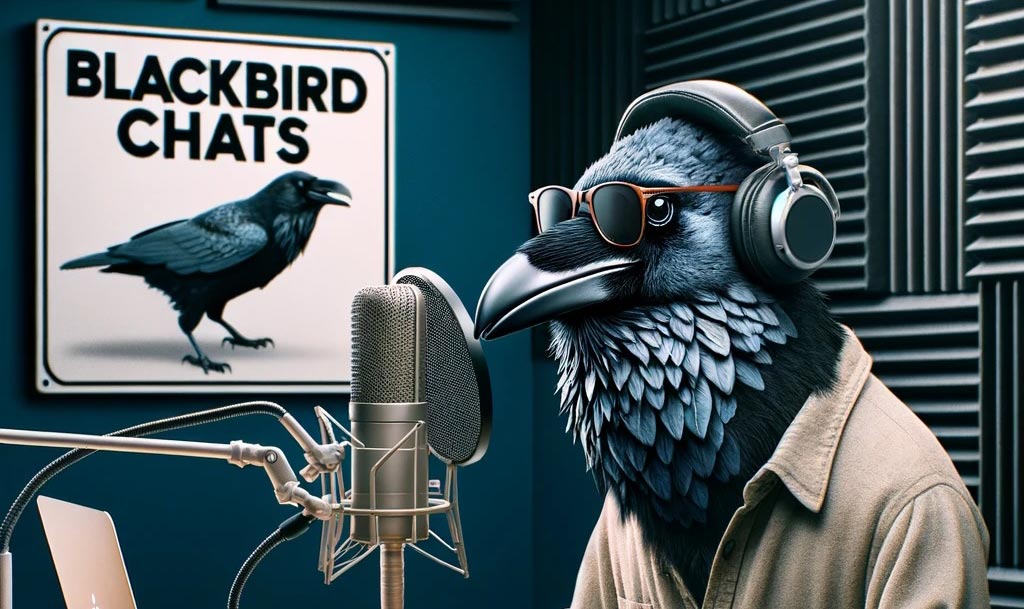Demoting the Truth: How Disinformation Nearly Destroyed a Podcast
How a morning workout unleashed a disinformation attack and social media backlash
Posted by The RAV3N Team on March 20, 2024

It wasn’t the opening shot of an international conflict. It wasn’t a cyberattack, nor did it involve governments, major consumer brands, or a political movement.
It was a podcast. Episode two, to be exact. This podcast unwittingly became a master class in communication errors, the debate over work-life balance, the fantastic speed at which disinformation travels across social media, the impact of a disinformation attack, and the importance of an appropriate, transparent response strategy.
The podcast hosts unwittingly joined an increasingly inclusive club, suffering one of the thousands of attacks that can develop and quickly gain traction across the information landscape, including social media and news platforms. When they gain traction and go viral, these attacks can lead to severe reputational, financial, and societal harm to organizations of all sizes and types, including financial and government institutions, consumer brands, pharmaceutical corporations, and other verticals. Case in point: The World Economic Forum declared disinformation the number one global threat in 2024.
This was a specific attack targeted against a new podcast and one host. The team was fortunate in that they found out about this attack immediately. Thanks to this, they were able to respond quickly and appropriately, thus stemming the tide of negative sentiment and false narratives and mitigating their reputational and financial damage.
The Cast and the Context
Hosted by Natalie Marie (known as “Corporate Natalie”) and Ross Pomerantz (known as “Corp”), “Demoted” is a new podcast that offers “a whole lot of unsolicited advice, heated debates over office etiquette, hilarious role-plays, crazy workplace stories submitted by listeners.” During the second episode, Marie shared a listener-submitted story about a Gen Z new hire who declined an invitation to an 8 AM meeting because it interfered with their workout class. (Warning: Strong language is used in the video.)
The email read, “When asked to come in for an 8 AM meeting, my Gen Z new hire said, ‘Ugh, sorry, can’t make it. I have a workout class.’ Should this be allowed?”
The hosts responded in disbelief and did not favor the new hire. Ms. Marie and Mr. Pomerantz took the side of the HR rep, saying that the employee had just started this job and that an 8 AM workout was much too late—perhaps a better time for a class would be at 6 or 7 AM. Mr. Pomernatz would say, “To monopolize your calendar for things that I would consider personal time, that’s gonna be a ‘no’ for me…You’re going to have to give up some things.”
This question and the hosts’ responses were used as a promotional clip and released on social media. According to the Demoted hosts, clips are subject to a review and approval process before release. This clip was approved and went live.
The Attack
Alexandre Evidente, a TikTok creator, used the clip in a type of reaction video known as a stitch. During this stitch (which “stitches” a video from one creator into a response video from another), he addressed Ms. Marie directly:
“Yeah, Natalie, so we can talk about this more later. But I’m gonna address this now. It was made very clear during the interview process that the working hours for this position [are] between 9 to 5 PM Eastern Time and I am on Eastern time. I made that very clear with HR because I have commitments outside of work.”
Mr. Evidente continued, “Okay, let’s just say I skip the gym. Two things. When can I expect you to reimburse me for my class and two, are you going to be paying me from 8 AM to 9 AM? Or at the very least let me leave at 4 PM. Natalie if your answer to both of those are no then there’s no discussion needed. I will see you at nine o’clock today. Also, I sent an email to HR about this and sent them the link to that TikTok video. So, just to make things clear.”
But there was a problem. Mr. Evidente’s video implied he was the employee in question and worked for Ms. Marie. He didn’t mention that his response was, in fact, a skit; the two had never met.
While the opinions and emotions in the reaction were genuine, the context was a false narrative that quickly gained traction.
What Happened Next
Within roughly 24 hours, Mr. Evidente’s stitch had millions of views and tens of thousands of comments, with most commenters taking his side, demanding that Ms. Marie apologize and sounding off over work-life balance and what constituted reasonable expectations by employers.
But the narrative also prompted thousands of comments personally attacking the hosts, with Ms. Marie receiving threats and Mr. Pomerantz antisemitic comments. The response was so heated, and there were so many arguments between posters that the hosts decided to take the original promo clip down.
But how far had the narrative reached, and how convincing was the disinformation? By the time the hosts addressed the attack in their next episode, they had cited 32 million views and nearly 50,000 comments.
After the apology video was released, a reporter from Buzzfeed contacted Ms. Marie to ask about the conversation with her employee, and she was shocked when she was told about the host’s experience.
Did the reporter learning the full context change the narrative? Yes.
The Response and Post-mortem
In the wake of the attack, Ms. Marie created an apology video and later said she wasn’t sure what she was apologizing for. During this response, she clarified her stance:
“If you are hourly or you work a job that the hours are strictly nine to five, please do not work outside those hours…the way the social clip was cut and just the things we were saying and how we’re reacting and getting so fired up about it, totally take ownership for that.”
Unfortunately for the Demoted team, that video received far fewer views than that with the false narrative.
Mr. Evidente made a follow-up, admitting that his initial response was a skit, but it, too, received millions fewer views than the original video. Additionally, when responding to commenters in the original video, he reportedly responded in character as the angry employee, which only helped fuel the false narrative. Mr. Evidente acknowledged during a call with Buzzfeed the steps he could have taken to clarify that this was a skit. “I think that would help out in the future, and that’s one of the things I will be incorporating in my content moving forward.”
During the next episode, the hosts discussed the narrative attack and acknowledged their role in what had occurred, and it all boiled down to the lack of context in the clip. Pertinent information was left out, including:
- Clarity around the complainant. Ms. Marie is not the employer in question; instead, she read an email from an HR representative asking about the exchange with the new hire.
- Context around the complaint. According to the email submission, the new hire was aware of expectations around attending an 8 AM meeting when they joined the company.
- The meeting cadence. This 8 AM meeting was rare; it takes place quarterly at that time to accommodate international employees.
- Details about the employee. Finally, despite the impression given, the employee was a salaried consultant rather than an hourly employee.
Had this context been included in the promotional clip, it could have prevented the attack.
The hosts shared other lessons learned:
- The promotional clip’s brevity misrepresented the show’s tone. With little context, the comedic approach sounded “brutal,” as if it leaned into generational stereotypes.
- They also acknowledged the importance of transparency and that new podcasters have much to learn.
- Don’t respond in the heat of the moment.
- “What happened to us could happen to anyone.”
Did the response work? According to one commenter on YouTube: “As someone who initially came here to hate on y’all from a random reel, you’re both very professional, and I hope you both succeed…you’ll get your karmic justice and blow up for a good reason soon.”
“We All Love a Good Story.”
This comment from Ross Pomerantz in episode three is a simple and accurate explanation for the amplification of disinformation attacks. At face value, this story had it all – a hero, a villain, and a narrative that tapped into strong beliefs.
This attack hit a hot-button issue and inflamed viewers, feeding into different confirmation biases (e.g., stereotypes about younger employees and an oppressive corporate environment). And thanks to the vast expanse of the information surface, coupled with polarization around this issue, the “skit” racked up millions of views and tens of thousands of comments in roughly 24 hours.
Another common factor in a disinformation attack was the need for more critical thinking. Most had never heard of the podcast, were unfamiliar with the hosts and their comedic approach, and took the video at face value.
How We Can Help
With the sheer scale of the threat landscape, spotting disinformation attacks using conventional threat intelligence and social listening tools is almost impossible. This makes it imperative to partner with a narrative expert. These experts act as vital strategic partners, helping organizations quickly identify harmful narratives and execute the right strategy at the right time.
The BlackBird.AI Constellation Platform is a purpose-built Narrative Intelligence platform that enables organizations across industries and types to protect against emergent narrative attacks created by misinformation and disinformation that cause financial and reputational harm.
The Platform enables organizations to detect, measure, gain context, and prioritize risk by understanding the narratives, the influence behind them, the networks the narratives touch, the anomalous campaigns that scale them, and the cohorts that connect them. The platform enables risk analysis across the dark web, social media, and news platforms in 25 languages and redefines how organizations detect, measure, and prioritize narrative risk for critical decision-making.
A few key platform features:
- Narrative intelligence surfaces the emerging narratives that drive online conversations, analyzing how they spread and grow.
- Actor intelligence identifies and maps the most influential actors, cohorts, networks, and actors’ intent and motives.
- Threat intelligence via the Blackbird.AI Risk Index scores threats related to toxicity, polarization, automated networked activity, sexism, hate speech, misinformation, and other dangerous characteristics.
- Impact intelligence allows organizations to understand better and predict the impact of ongoing harmful activity across the information landscape while measuring the success of their mitigative efforts.
As Ross Pomerantz said, an attack can happen to anyone. Learn about Blackbird.AI and how we can protect your organization’s reputation by booking your personalized demo today.
About Blackbird.AI
BLACKBIRD.AI protects organizations from narrative attacks created by misinformation and disinformation that cause financial and reputational harm. Powered by our AI-driven proprietary technology, including the Constellation narrative intelligence platform, RAV3N Risk LMM, Narrative Feed, and our RAV3N Narrative Intelligence and Research Team, Blackbird.AI provides a disruptive shift in how organizations can protect themselves from what the World Economic Forum called the #1 global risk in 2024.



